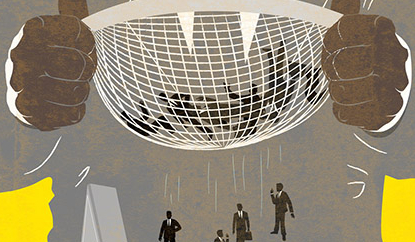深圳经济特区企业破产条例(一)
|
深圳经济特区企业破产条例 (Adopted at the Nineteenth Meeting of the Standing Committee of the Second Shenzhen Municipal People‘s Congress on November 10, 1993.) Chapter I General Provisions Article 1 In order to standardize the acts of corporate bankruptcy, protect the lawful rights and interests of debtees and debtors, maintain the order of the market economy of Shenzhen Special Economic Zone (hereinafter referred to as “Special Zone”), these regulations are hereby formulated. Article 2 These regulations shall be applicable to the enterprise legal persons unless as otherwise as stipulated by laws and regulations: (1) Enterprises legal persons which registered in the Special Zone; and (2) Enterprise legal persons, being registered outside the Special Zone, however whose domicile locate in the Special Zone. Article 3 An enterprise shall be reconciled or declared bankruptcy in accordance with these regulations in case it lacks the ability to repay the debt due for repayment. The suspension of an enterprise to repay the debt due for repayment shall be regarded as lack of ability to repay such debt. Article 4 After acceptance of a bankruptcy case, a people‘s court shall not declare bankruptcy of an enterprise in one of the following circumstances: (1) Public enterprises and enterprises essentially relevant to the national economy and the people‘s livelihood, that being financed or whose debts being discharged through other manners by the relevant governmental authority; and (2) Gaining a guarantee, by which the debts will be repaid within 6 months from the date of application of bankruptcy. Article 5 A bankruptcy case shall come under the jurisdiction of the people‘s court at the place where the debtor’s domicile locates. A bankruptcy case of a foreign invested enterprise shall come under the jurisdiction of the intermediate people‘s court of Shenzhen Municipality. Article 6 Where there no provisions are specified in these regulations on litigation procedure of a bankruptcy case, provisions of laws of civil procedure shall be applicable. Article 7 In the case that the title administration authority of a state-owned enterprise, which has been applied by its creditors to go bankruptcy, applies for rectification of the enterprise, national law on bankruptcy of enterprise shall be applicable. Article 8 The social insurance of employees of a bankruptcy enterprise shall be handled according to relevant provisions of the Special Zone. Chapter II The Raise and Acceptance of an Application of Bankruptcy Article 9 In the case that a debtor lacks the ability to repay the debt due for repayment, the debtee may apply to declare the debtor bankrupt for debt repayment, and the debtor also may apply to declare itself bankrupt for debt repayment. In the case that a state-owned enterprise lacks the ability to repay the debt due for repayment, however neither the debtor nor the debtee apply to declare the debtor bankrupt, the department in charge of the state-owned enterprise may apply to declare the enterprise bankrupt. Article 10 During the liquidation of an enterprise other than bankruptcy liquidation, the liquidation group shall apply to a people‘s court to declare the enterprise bankrupt in case it find the assets of the enterprise are insufficient for repayment of debts. Article 11 A bankrupt application shall be submitted to a people‘s court in the case of applying for bankruptcy. In the case of applying for declaration of bankruptcy of a debtor by a debtee, the debtee shall provide proof relevant to the amount and character of the creditors and the proof that the debtor being incapable to repay the due debt. In the case of applying for declaration of bankruptcy of a debtor by the debtor itself, the state-owned title administrative authority or the liquidation group other than bankrupt liquidation shall submit the description on property situation and a list of credit and debts. Article 12 A people‘s court shall make a determination to accept or dismiss of a case within 10 days upon receiving an application. In case a bankrupt applicant rejects to the determination of the preceding paragraph, he may proceed with an appeal. Article 13 A people‘s court shall inform the debtor and publish an announcement within 10 days upon accepting a case of bankruptcy. In the case that the creditors apply the bankruptcy, the debtor shall submit the description on property situation and a list of credit and debts to the people’s court within 15 days upon receiving a notice from the court; while the court shall inform the known creditors within 10 days upon receiving the aforesaid materials. The announcement and the notice shall record the following matters: (1) the time when placing a case on file; (2) the debtor of the case of bankruptcy; (3) the time limit and place for declaration of creditors and the legal consequence for overdue declaration of creditor; and (4) the date and place for convoking of the first creditors meeting. Article 14 Where a debtor act as a guarantor for other unit, he shall inform the relevant party within 5 days upon receiving the circular from the people‘s court. Article 15 Creditors shall declare within 30 days upon receiving the notice, and those who have not received the notice shall declare within 90 days from the date of announcement, their creditor‘s rights to the people’s court, describing the amount of the creditor‘s rights and whether there are property guarantee and submitting relevant evidence . It shall be regarded as automatically abandon the creditor‘s rights in the case of overdue declaration of the rights. But is shall be otherwise if such delay of declaration is not attributed to the creditor’s liability and the declaration comes before the distribution of the assets of bankruptcy enterprise. The creditors with a guarantee and those without a guarantee shall be separately booked in by the people‘s court. Article 16 Where a people‘s court accepts a bankruptcy case, any civil procedure for execution of the debtor’s assets shall be suspended. Article 17 After a people‘s court has accepted a bankruptcy case, any repayment of debt to part of the creditors by the debtor shall be invalid, except otherwise those essential for normal business of the debtor. Article 18 During the period that six months ahead of a people‘s court accepting a bankruptcy case to the end of the bankrupt procedure, any following acts conducted by a debtor shall be invalid: (1) concealing, partitioning without authorization or transferring assets without any consideration; (2) selling assets at a deviant lower price than normal; (3) providing a property guarantee for initially unguaranteed debts; (4) making payment of undue debts beforehand; and (5) abandoning his own creditor‘s rights. Chapter III Creditors Meeting Article 19 A creditors‘ meeting shall be constituted by all of the creditors. Members of a creditors‘ meeting, other than those who have property guaranty and have not given up priority of claim, shall enjoy the voting power. While a guarantor of a debtor, after payment of subrogation for a debtor, may be regarded as a creditor and shall enjoy the voting power. The chairman of a creditors meeting shall be appointed by a people‘s court from those creditors with voting power. Article 20 The legal representative and relevant personnel of a creditor shall attend the creditors‘ meeting and answer any inquires. Article 21 The first creditors‘ meeting shall be held by the people’s court within 15 days upon the expiration date of declaration of creditor. The creditors‘ meeting of afterwards shall be held when the people’s court or chairman of the creditors‘ meeting thinking it is necessary, or upon requested by the liquidation group or more than one fourth of the non-guaranteed creditors. Article 22 The power of a creditors meeting shall be as follows: (1) examining certification materials of relevant creditors and affirming the amount of the creditor‘s rights and whether any property guaranty involving in; (2) discussing and passing a draft reconciliation agreement; and (3) discussing and passing scheme for disposing and distributing of bankrupt assets. A creditors meeting may elect a representative to acquaint with liquidation circumstances of a liquidation group and supervise the proceeding of bankrupt procedure. Article 23 The decisions as referred to in the Items (1) and (3) of the preceding article shall be adopted by more than half of the voting rights held by the creditors, who represent half of the amount of the non-guaranteed creditors, presenting at the creditors meeting. While the Item (2) of the preceding article shall be adopted by the creditors, who represent two third of the amount of the non-guaranteed creditors, presenting at the creditors meeting. Article 24 The decision of a creditors meeting shall be bind to all of the creditors. In case any creditors reject to the decision of the creditors meeting, they may apply for ruling to a people‘s court within 7 days upon the decision being made. The aforesaid ruling shall be subject to no appeal. Chapter IV Conciliation Article 25 In the case that the creditors apply for bankruptcy against a debtor, the debtor may apply for conciliation to the people‘s court within the period that after the court accepting the case and before declaring of the bankruptcy. Article 26 In the case of applying for conciliation, the debtor shall submit the following documents: (1) an application for conciliation; (2) a description of situation of its properties; (3) a list of creditors and debts; and (4) a draft agreement on conciliation. In case there is a guaranty provided by a third party, the debtor shall provide relevant evidence on such guaranty. Article 27 A draft agreement on conciliation shall include the following matters: (1) the names of the enterprise applying for conciliation and the creditors, the amount of creditor‘s rights; (2) the time limit for delay of repayment of debt or the amount of debt exempted; (3) the situation of producing and operating and the reason of losing; and (4) the measures to reinforce capability for repaying debts. In case there is a guaranty provided by a third party, the name, domicile of the guarantor and content of the guarantee shall be noted in the draft agreement on conciliation. Article 28 A people‘s court shall make order on approval or disapproval of conciliation within 7 days upon receiving an application. The aforesaid order shall be subject to no appeal. Article 29 A people‘s court shall not approve the application for conciliation in one of the following cases: (1) The application failing to comply with Article 26 of these regulations and has not been rectified within time limit; and (2) The legal representative or relevant person in charge, who summoned by a people‘s court, failing to appear in the court without warrant, presenting with untrue statement or refusing to provide relevant documents. Article 30 In case a people‘s court approves an application of conciliation, the court shall appoint members of a supervisory group of conciliation among the certified public accountants, lawyers or other professionals. A supervisory group of conciliation shall be responsible for and make work report to the people‘s court. Article 31 Upon approving an application of conciliation, the people‘s court shall make an announcement within 7 days on the following matters: (1) the reasons for approving of an application of conciliation; (2) the names and domicile of the members of the supervisory group; and (3) the time and place for holding a creditors meeting to discuss a draft agreement on conciliation. Article 32 The powers of a supervisory group of conciliation shall include: (1) supervising the operations of the enterprise which applies for conciliation; and (2) examining the account books and documents of the enterprise which applies for conciliation. Article 33 In case a people‘s court approves an application for conciliation of an enterprise, the operations of the enterprise shall be supervised by the supervisory group of conciliation. The legal representative and relevant person in charge shall accept the examination carried out by the supervisory group of conciliation on relevant books, documents and assets and reply the inquiries relevant to operations raised by the group. Article 34 The legal representative and the person in charge shall attend the creditors meeting for discussing a draft agreement on conciliation and reply inquiries. After receiving a notice, in case the legal representative and relevant persons in charge of the enterprise that applies for conciliation fail to attend the creditors meeting without reasonable ground or present at the meeting or refuse to reply any inquiries, it shall be regarded as revoking the application for conciliation and the people‘s court shall declare the enterprise to go bankruptcy. Article 35 The people‘s court shall make order on termination of conciliation procedure in case the creditors meeting votes down the draft agreement on conciliation. The aforesaid order shall be subject to no appeal. Article 36 The people‘s court shall make the order on approval or disapproval of conciliation within 10 days after the draft agreement on conciliation adopted by the creditors meeting. The aforesaid order shall be subject to no appeal. Article 37 The people‘s court shall not approve the conciliation in one of the following circumstances: (1) the decision of the creditors meeting violating laws and regulations; and (2) there being some fraud involving in the agreement on conciliation. Article 38 The people‘s court shall publish an announcement within 5 days upon approving the agreement on conciliation, which shall be legally binding as of the date of announcement. Article 39 An agreement on conciliation shall not affect the rights of the creditor with a property guaranty, except being agreed upon by the creditor. Article 40 During the period of performing an agreement on conciliation, in case the debtor commits one of the following acts, the people‘s court shall make order on termination of conciliation procedures: (1) the debtor refusing to fulfill or without capacity to fulfill the agreement on conciliation; (2) the situation of assets of the debtor going worsen, and the creditors meeting applying for termination of conciliation; and (3) the debtor committing the acts as listed in Article 18 of these regulations, which results in seriously detriment to the interests of the creditors. The aforesaid order shall be subject to no appeal. Article 41 In case the debtor repay the debts according to the agreement on conciliation upon the expiration of the period of conciliation, the people‘s court shall make order on termination of bankrupt procedures and publish an announcement thereof. In case the debtor is incapable of repaying the debts according to the agreement on conciliation upon the expiration of the period of conciliation, the people‘s court shall declare the debt to go bankruptcy and afresh registration of creditors. Chapter V Declaration of Bankruptcy and Bankrupt Liquidation Section I The Declaration of Bankruptcy and its Effect Article 42 The people‘s court shall make order on declaration of bankruptcy of an enterprise in one of the following circumstances: (1) the debtor having not applied for conciliation after the people‘s court accepting the case of application of bankruptcy raised by the creditors; (2) the application for conciliation being disapproved according to Article 29 of these regulations; (3) the draft agreement on conciliation being voted down by the creditors meeting according to Article 35 of these regulations; (4) the agreement on conciliation being disapproved according to Article 37 of these regulations; (5) the conciliation procedures being terminated according to Article 40 or these regulations; and (6) the debtor being incapable of repaying debts according to the agreement on conciliation upon expiration of the period of conciliation. |








